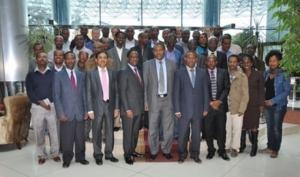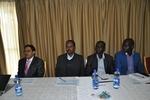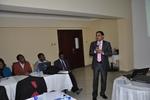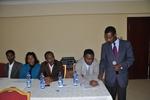Ethiopia Steps Up Actions for Dengue Prevention and Control
Addis Ababa. 23 July 2014 – An international consultative workshop on dengue prevention and control strategies, organized by the Ethiopian Public Health Institute (EPHI) of the Federal Ministry of Health (FMoH) in collaboration with the World Health Organization (WHO) and the US Center for Disease Control and Prevention (CDC), took place in Addis Ababa on 21 and 22 July 2014 bringing together dengue experts from WHO and CDC, surveillance experts from the FMoH, regional health bureaus, universities and other national medical and research institutions, and representatives from Djibouti, Kenya, Senegal and Tanzania.
EPHI Director General, Dr Amha Kebede welcomed the 40 participants of the workshop, thanking them for their participation, and the Honorable Dr Kebede Worku, Ethiopian State Minister of Health, opened the workshop by assuring participants that “Ethiopia will identify and take lessons regarding which strategies to adopt for the prevention and control of dengue disease from countries that have good experience in this.”
The meeting objectives, as outlined by Dr Daddi Jima, EPHI Deputy Director General, focused on the epidemiology of dengue, dengue fever prevention and control strategies, laboratory diagnosis and case management, surveillance and outbreak management, and vector control, and also on sharing lessons and experiences among affected African countries.
Dr Pierre M’pele-Kilebou, WHO Representative in Ethiopia, commended the FMoH for creating this platform to “discuss and agree on appropriate, evidence-based strategies for dengue prevention and control in Ethiopia” as Dengue has become the most rapidly spreading disease with the incidence which has grown dramatically around the world in recent decades with geographical expansion. Ethiopia reported Dengue outbreak for the first time in 2013.
On 7 April 2014, World Health Day was celebrated worldwide and in Ethiopia with the theme, “Small Bite: Big Threat”, with emphasis on creating awareness on the prevention of vector-borne diseases such as dengue, yellow fever, malaria and Leishmaniasis, which are preventable, yet have the biggest impact on some of the world’s poorest people. The World Health Day celebration sought to draw attention to mosquitos, flies, ticks and bugs with the message,“These vectors can be a threat to your health and your family; you can protect yourself and your family by taking simple measures that include sleeping under a bed net, wearing a long-sleeved shirt and trousers and using insect repellent.”
At the end of the consultative workshop, the following key recommendations were forwarded for strengthening dengue prevention and control in Ethiopia: expand the scope of the existing Malaria Control Program to include Dengue Fever and other Vector-Borne Diseases; initiate dengue surveillance by establishing sentinel sites at health centers and hospitals in the most affected areas of Dire Dawa, Afar and Somali Regions; strengthen capacity for laboratory diagnosis and case management; develop an integrated vector management strategy and plan of action; establish a coordination mechanism with relevant sectors, including establishment of a multi-sectoral task force; work with partners such as WHO, CDC and AFENET for capacity building in case management, integrated vector management and surveillance; actively engage in Advocacy, communication and social mobilization.
Dengue is a mosquito-borne viral infection that causes flu-like illness, and occasionally develops into a potentially lethal complication called severe dengue. Dengue is found in tropical and sub-tropical climates worldwide, mostly in urban and semi-urban areas, putting more than 40% of the world’s population at risk. Since 2013, Ethiopia has reported more than 12 000 dengue fever cases.
For more information, please contact Dr Israel Tareke G/Sillassie, Integrated Disease Surveillance and Response Officer, WHO Ethiopia; email: gebresillassiei [at] who.int (gebresillassiei[at]who[dot]int)
PHOTOS: WHO Ethiopia/ Loza Mesfin Tesfaye








